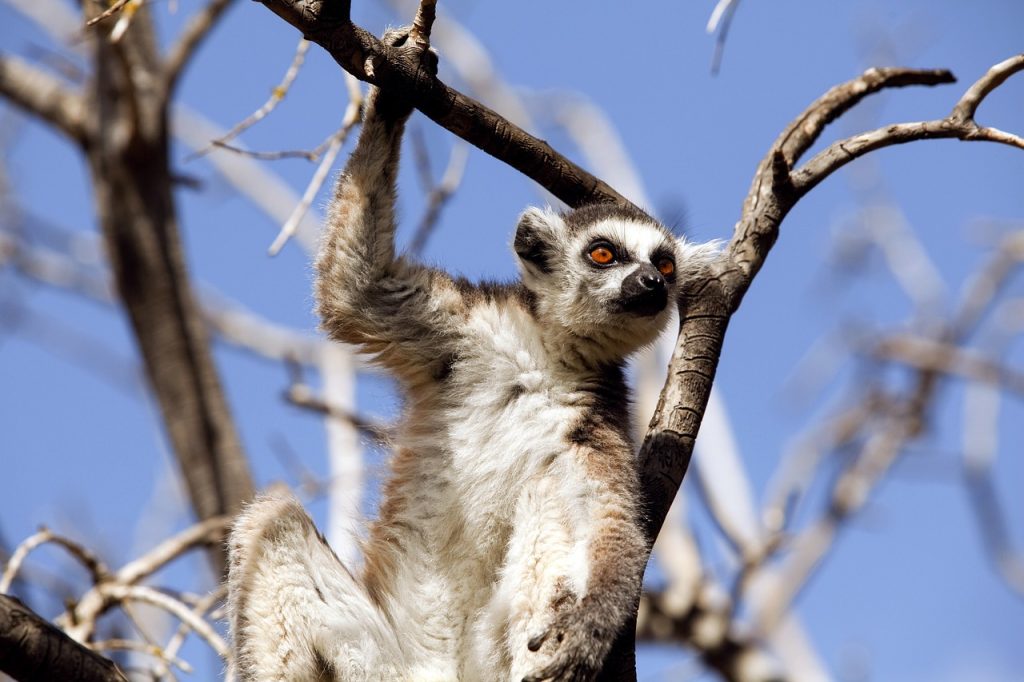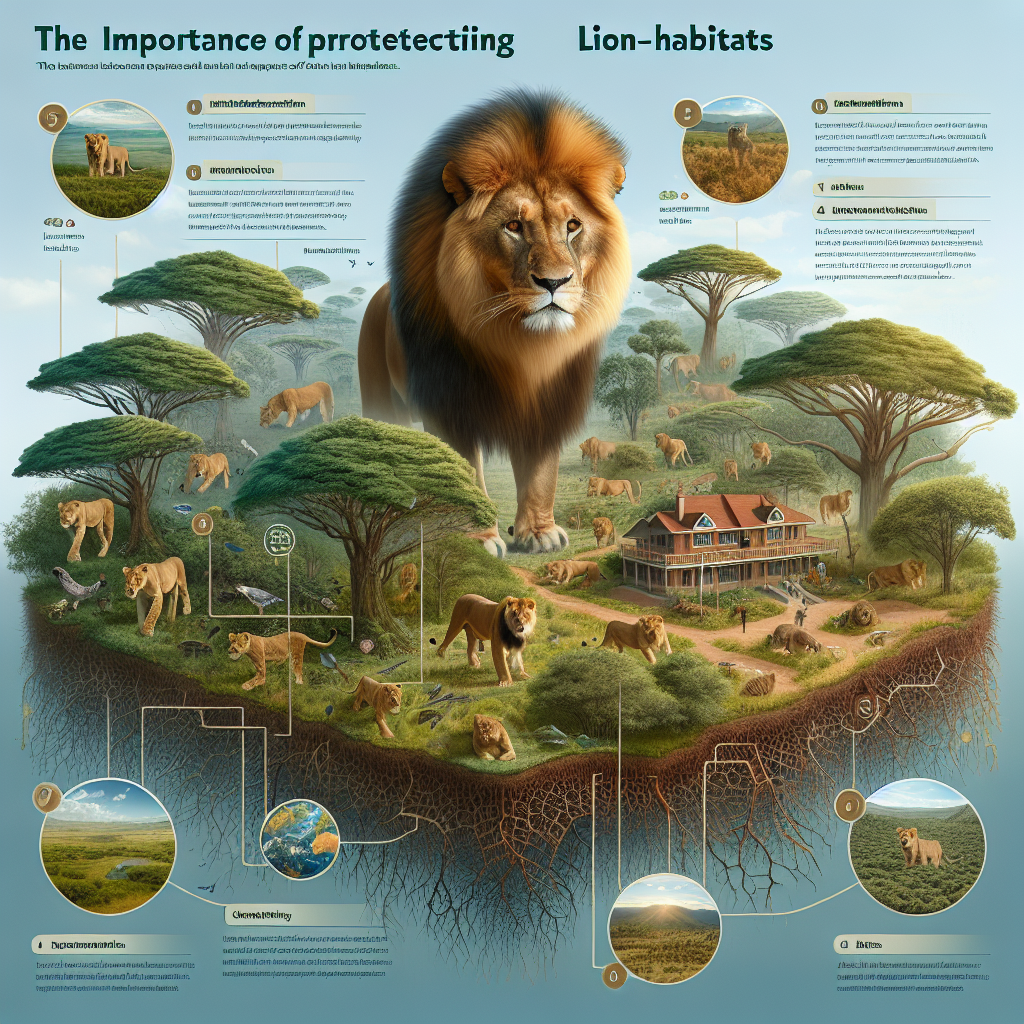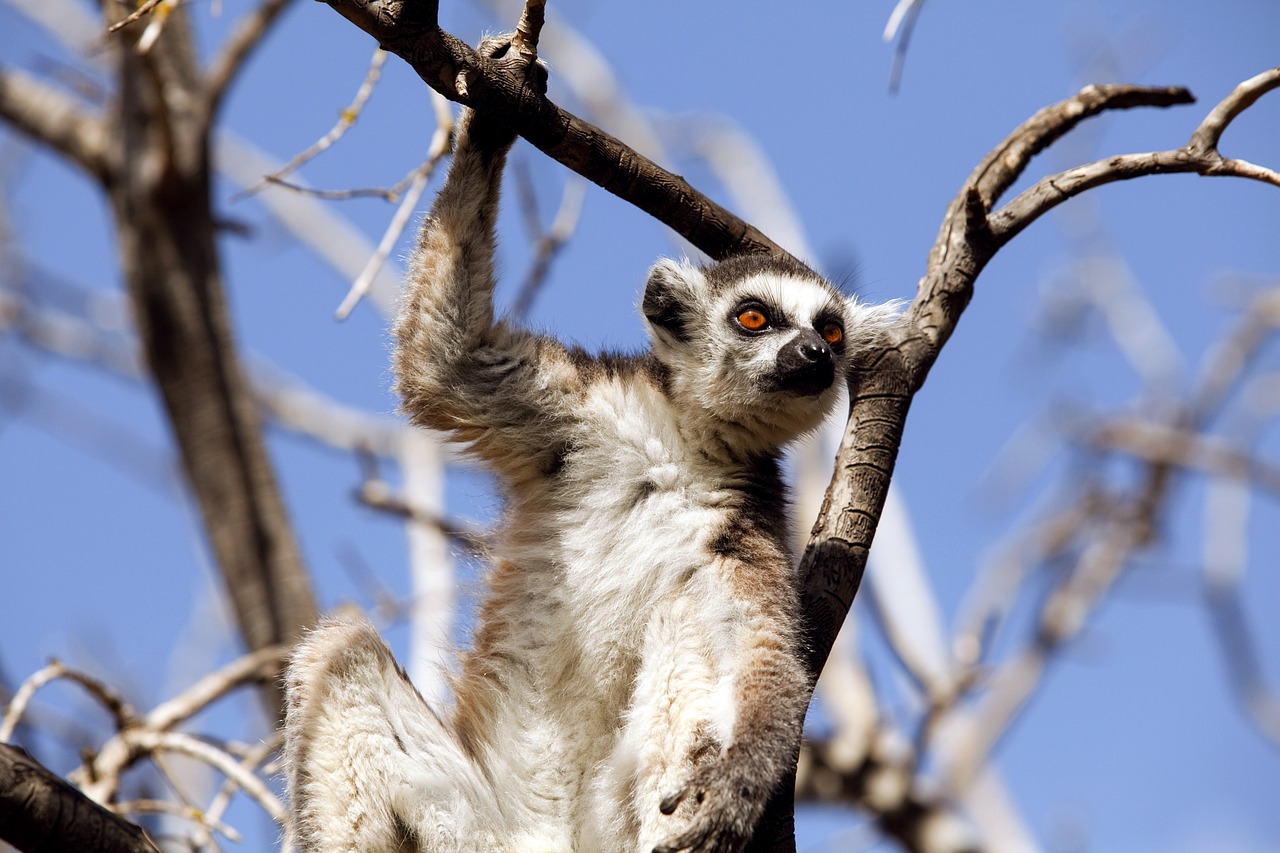So, you’ve probably heard about lions – the kings of the animal kingdom, majestic and powerful creatures that roam the vast African savannah. But did you know that their very existence is under threat due to the destruction of their habitats? It’s true. Lions, like many other species, are losing their homes at an alarming rate, and this loss of habitat not only affects them but also has far-reaching consequences for the entire ecosystem. In this article, we will explore the vital importance of protecting lion habitats and why it should be a priority for us all.
Habitat Destruction Threatens Lion Populations
Lions, the majestic creatures of the African savannah, are facing a grave threat to their populations due to habitat destruction. As human activities continue to encroach upon their natural habitats, lions are losing essential areas they need to thrive and survive. This habitat loss has far-reaching consequences, not just for the lions themselves, but also for the delicate ecosystems they are a part of.
Loss of Natural Habitat
One of the primary causes of lion population decline is the loss of their natural habitat. As human populations expand and the demand for resources grows, vast stretches of land are cleared for agriculture, settlements, and infrastructure development. These activities disrupt the lion’s natural environment, leaving them with limited space to roam and find prey. The shrinking of their habitats puts them at a heightened risk of conflict with humans and reduces their chances of survival.
Fragmentation of Habitats
Habitat fragmentation is another detrimental consequence of human activities. As lions’ habitats become fragmented, isolated pockets of land no longer provide the necessary resources for their sustenance. This fragmentation disrupts the natural movement of lions, hindering their ability to find mates, establish territories, and access prey. The separation of lion populations also leads to inbreeding and a loss of genetic diversity, further endangering their survival.
Conflict with Human Activities
The expansion of human activities often brings lions into direct conflict with humans. Lions may prey on livestock, leading to retaliation from farmers. In such instances, lions are often killed as a measure to protect livelihoods. Additionally, the encroachment of settlements and infrastructure near lion habitats increases the likelihood of negative interactions, posing a threat to both lions and humans. Addressing these conflicts is crucial for the long-term survival of lion populations.
Negative Impacts of Lion Habitat Destruction
The destruction of lion habitats carries severe consequences for both the lions themselves and the ecosystems they inhabit.
Decline in Lion Populations
The loss of habitat directly contributes to a decline in lion populations. With fewer spaces to inhabit and limited resources available, lions struggle to survive. The International Union for Conservation of Nature (IUCN) has listed lions as vulnerable, with a significant decrease in their numbers over the past few decades. If habitat destruction continues unchecked, lions may face the risk of extinction in the near future.

Disruption of the Ecosystem
Lions play a critical role in maintaining the balance of their ecosystems. As top predators, lions help regulate prey populations, preventing herbivores from overgrazing and impacting vegetation. Their predation also affects the behavior and movements of prey species, influencing the overall dynamics of the ecosystem. The loss of lions disrupts this delicate balance, leading to potential cascading effects throughout the food web.
Loss of Biodiversity
Lions are an integral part of the rich biodiversity found in African ecosystems. Their presence contributes to the diversity of species and helps maintain a robust and healthy ecosystem. When lion populations decline or become extinct in certain areas, it not only affects lions but also has ripple effects on other species. Protecting lion habitats is crucial to safeguarding the biodiversity and interdependence of species within these unique ecosystems.
Ecological Role of Lions in Their Habitats
Understanding the ecological role of lions in their habitats further highlights the need to preserve their natural environments.
Top Predators
As apex predators, lions exert top-down control on their ecosystems. They keep potential prey species in check, which helps prevent overgrazing and maintains a balanced prey population. This control is critical for the overall health of the ecosystem, as it affects the distribution and behavior of herbivores and the subsequent influence on vegetation patterns.
Regulation of Prey Populations
By exerting predation pressure on herbivores, lions help regulate the populations of these species. This regulation ensures that herbivores do not overconsume vegetation, which could have detrimental effects on the ecosystem. Lions play a vital role in maintaining the delicate balance between predator and prey, which has evolved over thousands of years.
Maintaining Ecosystem Balance
Lions act as key ecosystem engineers, shaping their habitats through predation and scavenging. By removing weak and sick individuals from prey populations, lions help maintain the overall health and resilience of the ecosystem. Their presence also influences the behavior of other species, such as scavengers who rely on lion kills for sustenance.

Preserving Lion Habitats for Ecological Stability
To ensure the long-term ecological stability of lion habitats, it is imperative to implement effective conservation strategies and protect their natural environments.
Conservation Strategies
Conservation organizations, governments, and local communities must collaborate on comprehensive conservation strategies. These strategies should focus on minimizing habitat destruction, mitigating human-wildlife conflicts, and promoting sustainable development practices. By addressing the root causes of habitat destruction, we can strive towards coexistence and long-term preservation.
Protected Areas for Lions
The establishment of protected areas, such as national parks and wildlife reserves, is crucial for lion conservation. These areas provide lions with undisturbed habitats where they can roam freely, establish territories, and reproduce. Protected areas also serve as havens for other species and contribute to the maintenance of healthy ecosystems.
Creating Wildlife Corridors
Creating wildlife corridors is an essential step in reconnecting fragmented lion habitats. These corridors are strips of land that connect protected areas, allowing for the free movement of lions and other wildlife. By establishing these corridors, we can mitigate the negative impacts of habitat fragmentation, encourage genetic exchange among lion populations, and maintain the ecological integrity of the landscapes.
Economic Benefits of Lion Habitat Protection
Conserving lion habitats not only benefits the ecosystem but also offers economic advantages that are crucial for local communities.
Tourism Revenue
Lions are a significant attraction for tourists visiting African countries. Safaris, wildlife-watching excursions, and eco-tourism activities centered around lions generate substantial revenue. By protecting lion habitats, we can ensure the sustained presence of lions, attracting visitors and bolstering the tourism industry. This revenue can then be reinvested in further conservation efforts and local development initiatives.

Job Creation
Conservation initiatives and the tourism industry generate employment opportunities for local communities. Jobs related to guiding, park management, hospitality, and wildlife research help stimulate local economies and provide sustainable livelihoods. By protecting lion habitats, we can contribute to poverty alleviation and improve the well-being of communities living in proximity to these areas.
Local Community Development
Engaging local communities in lion conservation efforts is crucial for long-term success. By involving communities in sustainable development practices, such as community-based ecotourism and wildlife management, we can foster a sense of ownership and responsibility. Empowering local communities leads to the preservation of lion habitats and helps build resilient, self-sustaining communities that benefit from both economic opportunities and the protection of their natural heritage.
Importance of Preserving Lion Cultural Significance
Lions hold significant cultural and spiritual value in many African societies. Preserving their habitats goes beyond ecological concerns and plays a vital role in maintaining cultural heritage.
Symbolic Role in Cultures
Lions hold a symbolic and revered position in various African cultures, representing strength, courage, and royalty. These cultural associations have been passed down through generations, shaping traditions, stories, and rituals. Preserving lion habitats ensures the continuity of these cultural beliefs and practices, connecting communities with their historical roots.
Spiritual Importance
For many indigenous communities, lions hold spiritual significance and are considered sacred beings. They are believed to possess qualities such as wisdom, protection, and guidance. By protecting lion habitats, we respect and honor the spiritual connections of communities, preserving their cultural practices and beliefs.
Tourism and Cultural Preservation
Tourism centered around lions not only benefits the economy but also plays a crucial role in cultural preservation. By showcasing indigenous knowledge, traditions, and rituals to visitors, local communities can reinforce their cultural identity and raise awareness about the importance of preserving lion habitats. This exchange between tourists and local communities fosters mutual understanding and appreciation, leading to enhanced cultural preservation efforts.

Preserving Lion Habitats for Education and Research
Conserving lion habitats not only benefits local communities and ecosystems but also contributes to scientific knowledge and educational opportunities.
Scientific Knowledge and Insights
Lions represent a vital research subject for scientists and conservationists. Studying their behavior, social structures, and ecological interactions allows researchers to gain insights into the complexities of ecosystems. The knowledge gained from these studies helps inform broader conservation efforts, influencing policies and management strategies for lion and habitat preservation worldwide.
Education on Conservation
Lions captivate the imaginations of people worldwide, making them a perfect ambassador for conservation education. By incorporating lion conservation into educational curricula and outreach programs, we can raise awareness about the importance of protecting habitats and the role of lions in maintaining healthy ecosystems. Education empowers future generations to become environmentally conscious individuals who actively contribute to lion conservation and broader ecological preservation.
Contributing to Global Understanding
Lion habitats serve as a microcosm of the interconnectedness between humans, wildlife, and the environment. By protecting and studying these habitats, we gain a deeper understanding of the intricacies of ecosystems, their fragility, and the urgent need for their preservation. The knowledge gained from lion conservation efforts contributes to the global understanding of environmental issues and aids in developing sustainable solutions for a more harmonious coexistence with nature.
Collaborative Conservation Efforts for Lion Habitats
Preserving lion habitats requires collaborative efforts at the international, national, and local levels.
International Cooperation
Lion habitats span multiple countries, highlighting the importance of international cooperation. Collaborative initiatives, such as transboundary conservation programs, enable governments to work together to protect lion populations and their habitats. Sharing knowledge, resources, and best practices fosters a unified approach towards conserving lion habitats and ensures the long-term survival of these magnificent animals.
Public-Private Partnerships
Public-private partnerships play a crucial role in lion conservation. Governments, non-governmental organizations (NGOs), and private stakeholders can join forces to implement effective conservation strategies, secure funding, and drive sustainable development practices. By leveraging diverse expertise and resources, public-private partnerships maximize the impact of conservation efforts and create lasting change.
Engagement of Local Communities
The involvement and support of local communities are vital for successful lion habitat preservation. Engaging communities in decision-making processes, providing sustainable livelihood alternatives, and promoting awareness and education about conservation foster a sense of ownership and stewardship. By working hand in hand with local communities, we can create a collaborative environment that ensures both the welfare of lions and the well-being of people.
Addressing Human-Wildlife Conflict for Lion Conservation
To protect lion habitats, it is crucial to address and mitigate conflict between humans and lions.
Promoting Coexistence
Promoting coexistence between humans and lions is essential for their mutual survival. Educating communities about lion behavior, implementing effective livestock management practices, and introducing measures to prevent lion attacks on livestock can reduce conflict and retaliation. Encouraging tolerance and understanding between communities and lions fosters a harmonious relationship and improves the chances of long-term conservation success.
Mitigating Livestock Predation
Livestock predation by lions can result in the loss of income and livelihood for communities living near lion habitats. Implementing measures such as secure enclosures, guard animals, and early warning systems can help mitigate the impacts of livestock predation. By finding innovative and sustainable solutions to protect both the livelihoods of communities and the well-being of lions, we can minimize conflicts and foster coexistence.
Community-Based Conflict Resolution
Implementing community-based conflict resolution mechanisms is crucial for effectively addressing conflicts between humans and lions. Establishing local forums, engaging in dialogue, and involving key stakeholders in finding mutually beneficial solutions can help alleviate tensions and promote peaceful coexistence. Empowering communities to take ownership of conflict resolution ensures that the needs and concerns of all parties involved are taken into account, leading to more sustainable outcomes.
The Role of Legislation and Enforcement in Habitat Protection
Strong legislation and robust enforcement mechanisms are essential for the effective protection of lion habitats.
Environmental Laws and Policies
Governments play a pivotal role in enacting and enforcing environmental laws and policies that safeguard lion habitats. Robust legislation can prohibit habitat destruction, regulate land-use practices, and ensure the creation and maintenance of protected areas. Well-designed policies provide frameworks for effective conservation, ensuring the long-term preservation of lion habitats and supporting sustainable development practices.
Penalties for Illegal Activities
Imposing significant penalties for illegal activities, such as habitat destruction, poaching, and the illegal wildlife trade, acts as a deterrent and helps combat these threats to lion habitats. By enforcing penalties, governments discourage illegal activities, disrupt criminal networks, and protect both lions and the ecosystems they inhabit. Strong enforcement mechanisms are vital for preserving lion habitats and combating the illegal activities that contribute to their decline.
Strengthening Law Enforcement
Investing in the training and capacity-building of law enforcement personnel is crucial for effective habitat protection. Enhancing the capabilities of rangers, wildlife authorities, and law enforcement agencies ensures that they have the necessary skills and resources to enforce environmental laws and combat illegal activities. Strengthening law enforcement efforts contributes to the protection of lion habitats and the long-term well-being of these magnificent creatures.
In conclusion, the preservation of lion habitats is crucial for ensuring the long-term survival of these iconic animals and the ecological stability of their ecosystems. By implementing conservation strategies, protecting their natural environments, engaging local communities, and addressing human-wildlife conflict, we can secure a future where lions not only roam freely but also continue to play their vital role in maintaining healthy and balanced ecosystems. The economic, cultural, educational, and scientific benefits associated with preserving lion habitats further emphasize the importance of collective efforts to protect these magnificent creatures and the landscapes they call home. By championing the conservation of lion habitats, we not only safeguard the future of lions but also contribute to the broader goal of preserving biodiversity and promoting sustainable development for the benefit of all.

